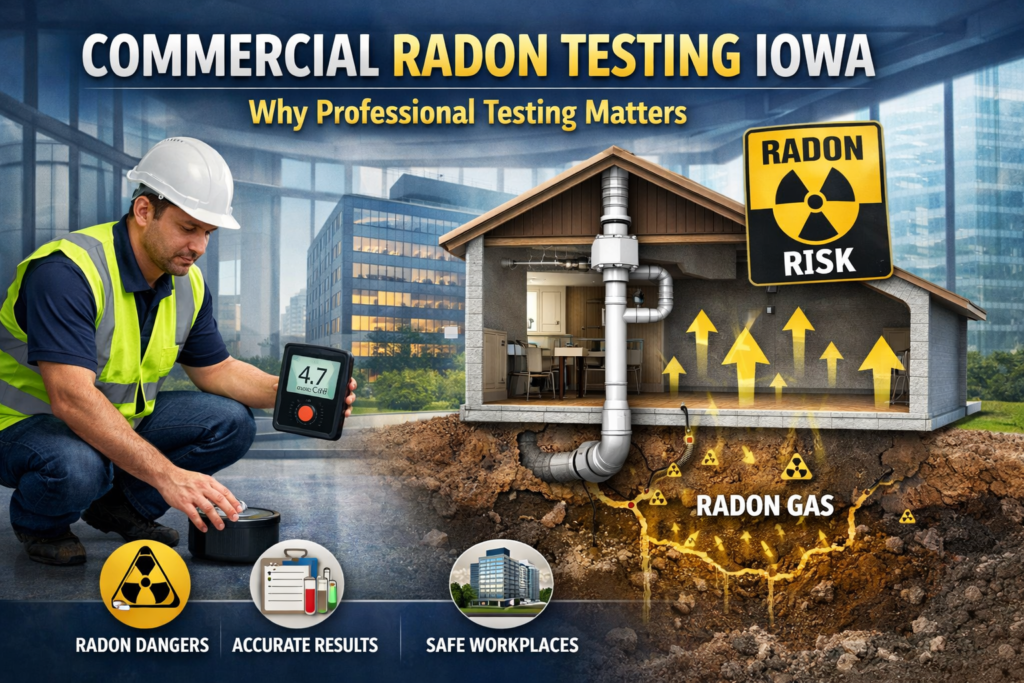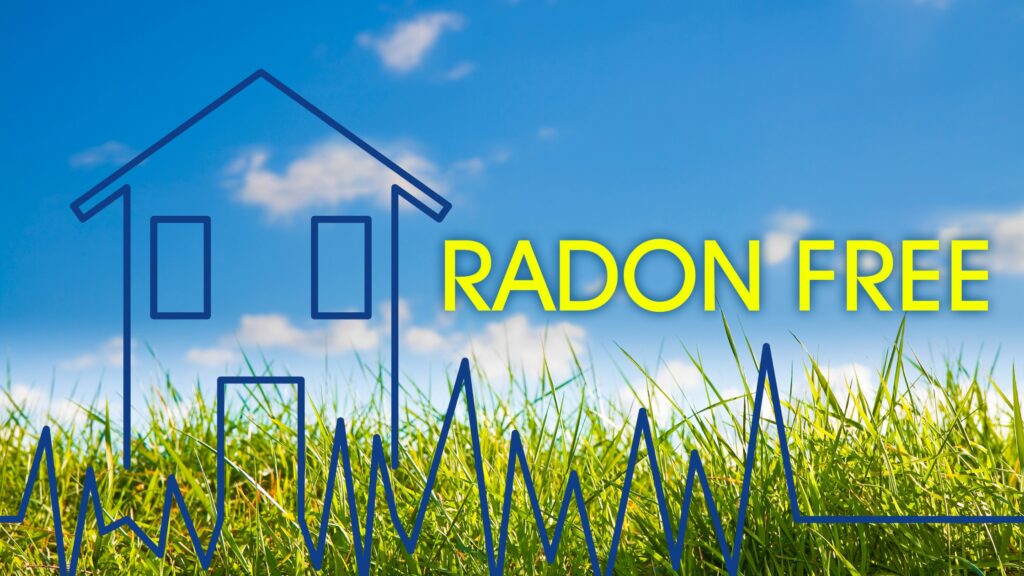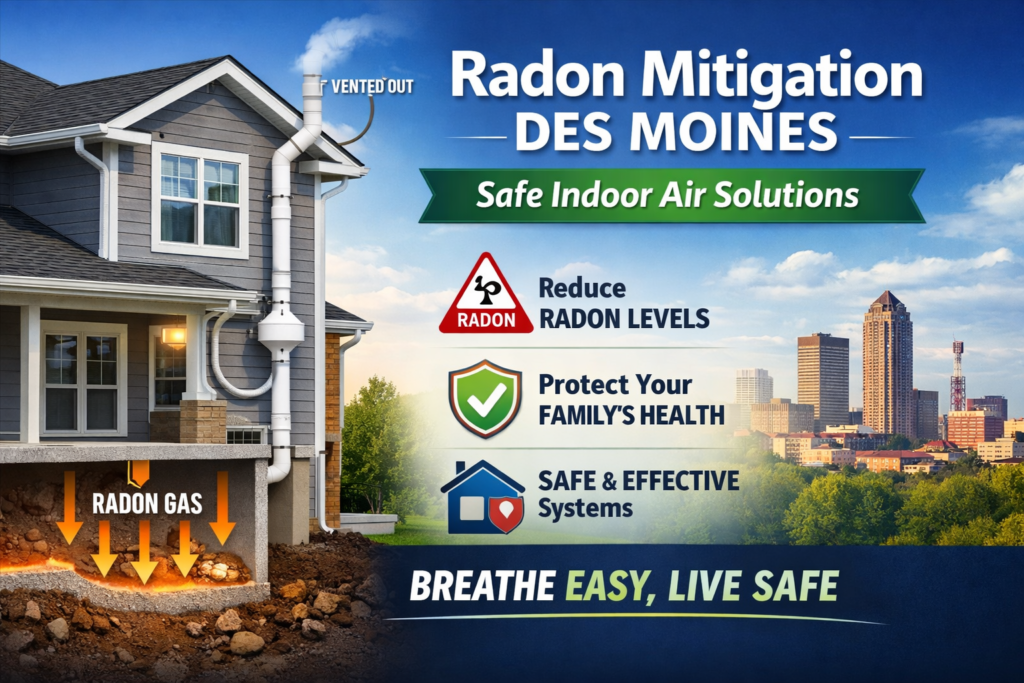Hiring a certified radon professional is the best way to keep your home, school, or workplace safe from the hidden danger of radon gas. Radon is the second leading cause of lung cancer in the U.S., so testing and fixing high levels requires proven expertise, not guesswork. In this article, we’ll explain what certification means, the standards certified experts follow, when it’s time to call one, and why Des Moines Radon is a trusted choice for families and businesses in Iowa.

1. What Does a “Certified Radon Professional” Mean?
A certified radon professional holds credentials from respected organizations such as the National Radon Safety Board (NRSB) or the National Radon Proficiency Program (NRPP). These certifications show that the professional has completed specialized training in radon testing and mitigation, successfully passed challenging exams, and stays current through continuing education. In addition, they follow strict ethical guidelines, giving homeowners and businesses confidence that every service is performed with accuracy, safety, and integrity.
2. Why Certification Matters for Your Health
Working with a certified radon professional ensures that both testing and mitigation are carried out under strict, proven standards. Certifications from organizations like the NRPP and NRSB are recognized by the EPA as reliable markers of skill and professionalism. While some uncertified providers may still perform adequate work, certification offers added confidence. It reassures homeowners and businesses that the expert will use approved testing protocols, well-calibrated equipment, and follow ethical practices from start to finish. Learn more about Professional Radon Mitigation In Des Moines.
3. Types of Radon Certifications and Standards
Certification pathways vary depending on the role of a certified radon professional:
A. Radon Measurement Technicians (RMT):
These professionals complete foundational training (often about 8 classroom hours), pass an exam, and work under supervision to place and retrieve testing devices.
B. Radon Measurement Specialists (RMS):
RMS providers go through more advanced training (around 16 hours), complete continuing education, and take on responsibilities such as analyzing test results and managing quality assurance programs.
C. Radon Mitigation Specialists (RRS):
RRS professionals receive approximately 24 hours of training, including hands-on fieldwork. They meet standards aligned with EPA proficiency requirements and are qualified to design and install effective radon mitigation systems.
These certification levels give homeowners and businesses a clear understanding of the depth of expertise and skill a certified radon professional brings to each project.

4. When Should You Hire a Certified Radon Professional?
You should hire a certified radon professional in situations such as:
- Real estate transactions – During home sales, radon testing is often required, and the EPA advises action if results show levels at or above 4 pCi/L. Having a certified radon professional ensures the process meets industry standards.
- Health and safety concerns – Certified experts provide accurate, dependable results to safeguard your family, staff, or tenants from the serious health risks of long-term radon exposure.
- Mitigation needs – When testing reveals high radon levels, certified professionals design and install effective mitigation systems, then conduct follow-up testing to confirm that your property remains safe.
Choosing a certified radon professional ensures that all work follows strict safety standards and delivers reliable, long-term protection.
5. What to Expect in a Professional Inspection or Mitigation
A certified radon professional follows a structured and reliable process to protect your home or business
5.1 Precise testing:
A certified radon professional installs and monitors testing devices using standardized protocols to avoid errors. They then interpret the results according to EPA benchmarks, giving you a clear picture of whether radon levels are within safe limits.
5.2 Effective mitigation:
If testing shows elevated radon levels, the professional applies proven solutions such as sub-slab soil depressurization for homes or water treatment when radon enters through water sources. These methods directly target the cause of exposure and ensure reliable results.
5.3 Post-mitigation verification:
Once the system is in place, they return for follow-up testing to confirm that radon levels remain low. They also provide instructions for routine maintenance, helping homeowners maintain a safe environment over the long term.
This clear, step-by-step approach ensures both accuracy and accountability, giving you long-term peace of mind.
6. Choosing the Right Certified Expert in Your Area
When choosing a certified radon professional, start by confirming that providers—such as Des Moines Radon—hold valid credentials from recognized organizations like NEHA or other national proficiency programs. After that, make sure they also:
- Serve your local area – A reliable certified radon professional should cover Des Moines and nearby communities, making sure you get prompt support without long delays.
- Offer complete solutions – It’s more convenient to choose a provider who offers both testing and mitigation under one roof, saving you the hassle of hiring separate companies.
- Handle different environments – Professionals with experience in homes, schools, and even waterborne radon issues bring broader knowledge and can adapt solutions to different settings.
- Provide clear guidance – A trustworthy expert delivers easy-to-understand reports, explains the results clearly, and offers follow-up care so you feel confident about long-term safety.
By using these criteria, you secure both proven expertise and dependable service for long-term protection in your area.

7. Conclusion
A certified radon professional plays a crucial role in safeguarding indoor air quality through precise testing and proven mitigation strategies. Choosing an expert with trusted credentials guarantees that your home, school, or business is serviced under recognized standards with accountability and care.
If you live in the Des Moines metro area, you can turn to Des Moines Radon, a trusted local provider led by certified professionals who specialize in accurate testing, effective mitigation, and personalized support. Learn more by visiting Des Moines Radon.





